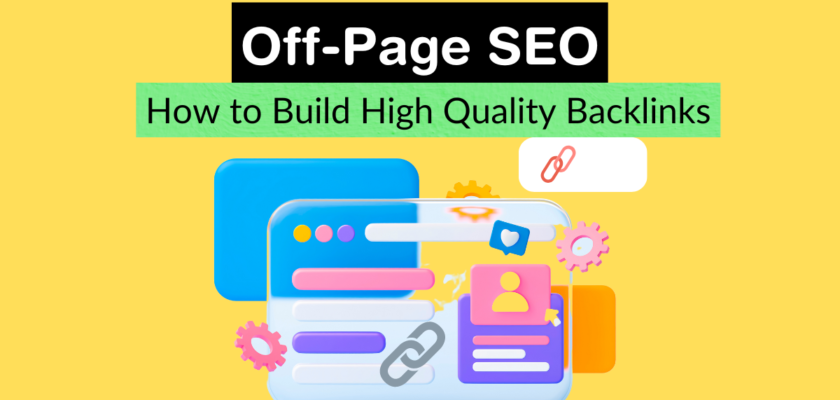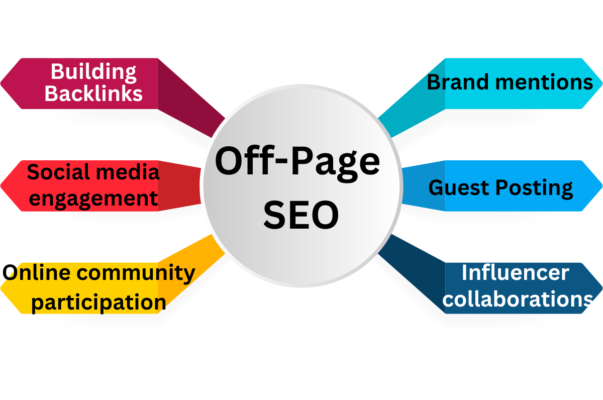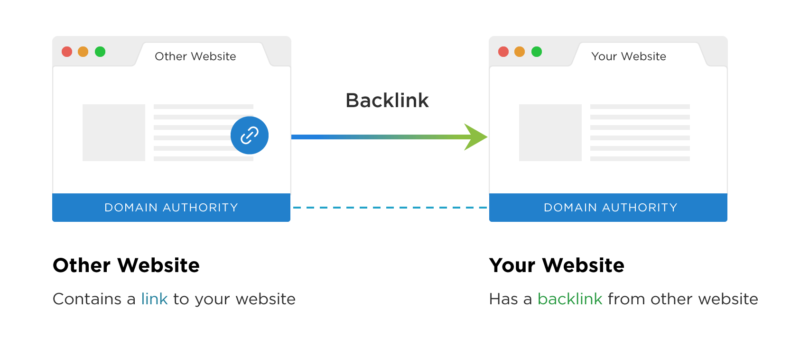Do you want your website to stand out in the vast online realm?
Are you ready to boost your website's authority and climb up the search engine rankings?
So, you have arrived at the perfect destination!
This tutorial will guide you through the exciting world of off-page SEO and teach you how to build backlinks that will boost the authority of your website.
What exactly is off-page SEO?
Off-page SEO refers to the optimization efforts conducted outside of your own website to improve its visibility, authority, and ranking in search engine results pages (SERPs). It's like the secret ingredient that adds that extra oomph to your website's online presence.
While on-page SEO focuses on optimizing elements within your website, off-page SEO involves actions taken on external websites to enhance your website's reputation, credibility, and relevance in the eyes of search engines.
Difference between on-page SEO and off-page SEO
What is off-page SEO and how does it differ from on-page SEO?
| On-Page SEO | Off-Page SEO |
|---|---|
| Focuses on optimizing elements within your own website. | Focuses on optimization efforts conducted outside of your website. |
| Actions taken directly on your website's pages and content. | Actions taken on external websites to enhance your website's reputation and authority. |
| Improves the overall structure, relevance, and user experience of your website. | Builds a strong backlink profile and establishes credibility. |
| Examples: keyword optimization, meta tags optimization, content optimization, URL structure, internal linking, site speed optimization. | Examples: acquiring backlinks, social media engagement, online community participation, influencer collaborations, and brand mentions. |
| Helps search engines understand the context and relevance of your website's content. | Helps search engines assess the popularity, trustworthiness, and relevance of your website based on external signals. |
Understanding the differences between on-page SEO and off-page SEO will help you develop an effective SEO strategy that covers both aspects in order to rank higher in search engines and improve your company's online presence.
Also read: On-Page SEO: A Step-by-Step Guide to Optimizing Your Website’s Content
Why is Off-page SEO so crucial?
Imagine creating amazing content, but no one knows about it or references it, so it's like hiding a beautiful piece of art in a dark room.
Off-page SEO is the spotlight that brings your website into the limelight, increasing its visibility, and attracting organic traffic. It's the key to winning the popularity contest in the digital world.
The secrets that will help you achieve new heights with your website will be revealed now as we dive into the exciting world of off-page SEO. Buckle up and get ready to become a master of building backlinks and boosting authority!
Significance of off-page factors in search engine rankings
Now, here comes the thrilling aspect: off-page SEO assumes a crucial role in determining the position of your website within search engine results.
Search engines, like Google, take into account various off-page factors to gauge the quality, relevance, and authority of your website. These factors act as a vote of confidence from other websites and online communities, indicating that your content is valuable and trustworthy.
One of the key components of off-page SEO is building backlinks.
A backlink is simply a link from another website that directs users back to your website. When reputable websites establish links to your content, search engines interpret it as a trust and authority signal. Consequently, this amplifies the credibility and visibility of your website within search results.
What are Backlinks?
Backlinks, referred to as incoming links or inbound links, these links originating from external websites that direct toward your own website. They are an important ranking factor for search engines because they signal that other website owners consider your content to be valuable and relevant.
Why are Backlinks Important?
Backlinks are important because they serve as “votes” for your website, indicating to search engines that other websites value your content. High-quality backlinks signal to search engines that your website is trustworthy, valuable, and an authoritative source of information.
How to Build High Quality Backlinks
Here are the exciting strategies that will help you build those valuable backlinks and establish your website as a trusted authority in your field!
Step 1: Researching and Identifying Relevant Websites
When it comes to off-page SEO and building backlinks, one of the first and most crucial steps is researching and identifying relevant websites within your niche or industry.
This step sets the foundation for successful link-building campaigns and ensures that your efforts are focused on the right targets.
So, let's dive in and explore how to effectively conduct research and identify potential backlink opportunities.
Importance of finding relevant websites
Imagine you're a fashion blogger trying to build backlinks from websites that focus on gardening or technology. It just wouldn't make much sense, right? That's why it's essential to find websites that align with your niche or industry.
When you target websites that share similar interests, topics, or target audiences, you increase the chances of acquiring relevant and high-quality backlinks.
Tips and tools for conducting effective research
Now that you understand the importance of relevance, let's explore some practical tips and tools to streamline your research process:
- Google Search: Start by using search queries related to your niche or industry. Look for websites that appear in the top search results for these queries. These websites are likely authoritative and have the potential to provide valuable backlink opportunities.
- Competitor Analysis: Analyze the backlink profiles of your competitors. Tools like Ahrefs, SEMrush, or Moz can provide insights into the websites linking to your competitor's content. Identify common backlink sources and consider reaching out to these websites for potential collaborations or partnerships.
- Industry Directories: Explore industry-specific directories or listings. These directories often categorize websites based on niche or industry, making it easier to find relevant opportunities.
- Social Media Platforms: Engage with social media communities related to your niche. Engage in discussions, showcase your expertise, and establish connections with influencers or website owners who might express interest in collaborating or linking to your content.
- Backlink Analysis Tools: Utilize backlink analysis tools to identify websites that link to your competitors but not to your own website. These tools can help you discover missed opportunities and reach out to website owners for potential link-building.
Now that you've grasped the importance of research, let's move on to the next step: creating engaging and valuable content that attracts backlinks like a magnet!
Step 2: Creating Engaging and Valuable Content
Ah, the heart and soul of any successful off-page SEO campaign: creating engaging and valuable content.
You see, high-quality content acts as a magnet for backlinks. When your content is informative, entertaining, and genuinely valuable to your target audience, other websites, and influencers will naturally want to link to it.
High-quality content establishes you as an authority in your niche, builds trust with your audience, and increases the likelihood of others considering you as a reliable source of information.
When you consistently produce valuable content, you create a reputation that attracts backlinks naturally.
Tips on creating high quality content
Let's explore some tips on creating content that captivates your target audience's interest:
- Understand Your Audience: Take the time to understand your target audience's needs, interests, and challenges faced by your target audience. Tailor your content to provide solutions, insights, or entertainment that resonates with them.
- Use Storytelling Techniques: People love stories! Incorporate storytelling elements into your content to engage your audience on an emotional level. Weave narratives, anecdotes, or case studies that connect with their experiences and make your content more relatable.
- Provide Actionable Advice: Offer practical tips, step-by-step guides, or actionable advice that your audience can implement immediately. When your content delivers tangible results, it becomes a valuable resource that others will want to share and link to.
- Visual Appeal: Don't underestimate the power of visuals. Use captivating images, infographics, or videos to enhance your content and make it visually appealing. Visual elements not only attract attention but also make your content more shareable and link-worthy.
By understanding your audience, offering unique perspectives, using storytelling techniques, providing actionable advice, and diversifying your content formats, you'll create content that not only attracts backlinks but also establishes your website as a valuable resource in your niche.
Step 3: Reaching Out to Website Owners and Bloggers
Now that you've created high quality content, it's time to spread the word and reach out to the websites which can potentially backlink to your valuable content.
So, let's dive into effective strategies for reaching out, the importance of personalized outreach messages, and tips for building fruitful relationships.
Effective strategies for reaching out to website owners and bloggers
- Research and Target: Before reaching out, conduct thorough research on the websites and bloggers you plan to contact. Understand their content, audience, and areas of interest. Tailor your outreach efforts to match their niche and demonstrate that you've taken the time to familiarize yourself with their work.
- Provide Value: When reaching out, focus on offering value to the recipient. Explain how your content aligns with their website's theme or how it can benefit their audience. Highlight specific points or insights that may pique their interest and showcase the relevance and value of your content.
- Be Professional and Polite: Maintain a professional and respectful tone in your outreach messages. Keep your messages clear and concise. Show appreciation for their work and the potential opportunity to collaborate.
By employing effective outreach strategies, personalizing your messages, and building relationships based on genuine connections, you increase the chances of receiving positive responses and collaborating with others in your industry.
Now, it's time to take action and drag your off-page SEO game to the next level!
Step 4: Leveraging Social Media and Online Communities
In the world of off-page SEO, social media platforms and online communities play a vital role in expanding your reach, promoting your content, and attracting valuable backlinks.
By actively engaging with these platforms, you can tap into a vast network of potential link partners and amplify the visibility of your content.
So, let's explore some important tips for using social media effectively to boost your off-page SEO efforts.
Tips for using social media
Now, let's dive into some practical tips for effectively using social media to boost your off-page SEO efforts:
- Choose the Right Platforms: Focus your efforts on the most relevant platforms to ensure maximum engagement and visibility.
- Use Relevant Hashtags: Utilize relevant hashtags to increase the discoverability of your content. Research popular hashtags within your industry and include them in your social media posts to reach a wider audience.
- Collaborate with Influencers: Identify influencers within your niche who have a significant following and engaged audience. Collaborate with them by offering guest posts, interviews, or featuring their content on your website. This collaboration can lead to backlinks and exposure to a broader audience.
- Share Others' Content: Don't just promote your own content; share and promote valuable content from others within your industry as well. This reciprocity can lead to them noticing your efforts and being more willing to share and link to your content in return.
Step 5: Guest Blogging and Influencer Collaborations
When it comes to off-page SEO, two powerful strategies that can significantly boost your backlink profile and enhance your website's authority are guest blogging and influencer collaborations.
These tactics allow you to tap into existing audiences, expand your reach, and gain valuable backlinks from reputable sources.
So, let's dive into the concept of guest blogging, guidance on finding opportunities, and the benefits of collaborating with influencers in your industry.
What is guest blogging and its impact on building backlinks and authority?
Guest blogging involves creating and publishing content on other websites or blogs within your niche. By contributing insightful and valuable articles, you can showcase your expertise, tap into a new audience, and, most importantly, secure valuable backlinks to your own website.
The level of impact on your own website's authority is directly correlated with the reputation and authority of the websites you contribute to.
Guest blogging provides a win-win situation. The website hosting your content benefits from fresh perspectives and high-quality articles, while you gain exposure, credibility, and those all-important backlinks.
Guidance on finding guest blogging opportunities
To find guest blogging opportunities and pitch your ideas effectively, consider the following steps:
- Research Websites: Identify websites or blogs within your niche that accept guest posts. Seek out websites with a robust following, significant domain authority, and an audience that aligns with your target audience. Compile a list of potential websites to approach and establish connections with.
- Study Guidelines: Familiarize yourself with the guest blogging guidelines and requirements of each website you plan to approach. Pay attention to topics they are interested in, word count limits, and formatting preferences. Adhering to their guidelines will increase the chances of your pitch being accepted.
- Craft a Compelling Pitch: Tailor your pitch to each website, showcasing your understanding of their audience and their content style. Clearly explain the topic or idea you want to write about and highlight how it will benefit their readers. Be concise, confident, and professional in your pitch.
- Provide Writing Samples: Include links to relevant writing samples or articles you have previously published to demonstrate your writing style and expertise. This will help website owners assess the quality of your content and increase their confidence in accepting your pitch.
- Follow Up: Follow up politely after a reasonable period, expressing your continued interest and enthusiasm for contributing to their platform.
Step 6: Monitoring and Analyzing Backlink Performance
After putting in the effort to acquire backlinks, it's crucial to monitor their performance and evaluate their impact on your off-page SEO efforts.
Monitoring and analyzing backlink performance not only helps you understand the effectiveness of your strategies but also allows you to make informed optimizations and adjustments.
So, let's explore the importance of monitoring backlinks, introduce tools for tracking, and emphasize the need for ongoing optimization based on performance analysis.
Tools and techniques for tracking backlinks
To effectively monitor backlink performance, utilize the following tools and techniques:
- Backlink Tracking Tools
-Ahrefs
-SEMrush
-Moz
These tools provide comprehensive backlink tracking capabilities. They allow you to monitor new backlinks, track changes in your backlink profile, analyze referring domains, and assess the overall health and performance of your backlinks.
- Website Analytics: Utilize website analytics platforms like Google Analytics to track referral traffic from backlinks. It helps you understand how backlinks are driving visitors to your website, their engagement metrics, and the conversions they generate.
- Link Monitoring Alerts: Set up alerts or notifications within backlink tracking tools to receive updates on changes in your backlink profile. This allows you to promptly address any issues or opportunities as they arise.
- Link Evaluation Metrics: Assess the quality and relevance of backlinks by considering metrics such as domain authority, page authority, relevance to your niche, and the context in which the backlink is placed. These metrics provide insights into the potential impact of each backlink on your off-page SEO efforts.
Don't forget to monitor, analyze, and adapt to drive the best results from your acquired backlinks.
Read also: SEO 101: Step-by-Step Guide For Beginners to Optimize Your Website
Conclusion
In this article, we've explored the world of off-page SEO and provided a step-by-step tutorial on building backlinks and boosting authority.
Remember, off-page SEO is an ongoing process. It requires dedication, consistency, and continuous optimization. Stay proactive in monitoring backlink performance, adapting to changes, and seizing new opportunities that arise.
As you embark on your off-page SEO journey, keep in mind that building a strong backlink profile and boosting your website's authority takes time. Be patient and persistent in your efforts, and the results will follow.
So, don't wait any longer. Take action today and start implementing these off-page SEO strategies. Watch your website's authority grow, enjoy increased organic traffic, and see your rankings soar.
Now, go forth and conquer the world of off-page SEO!






